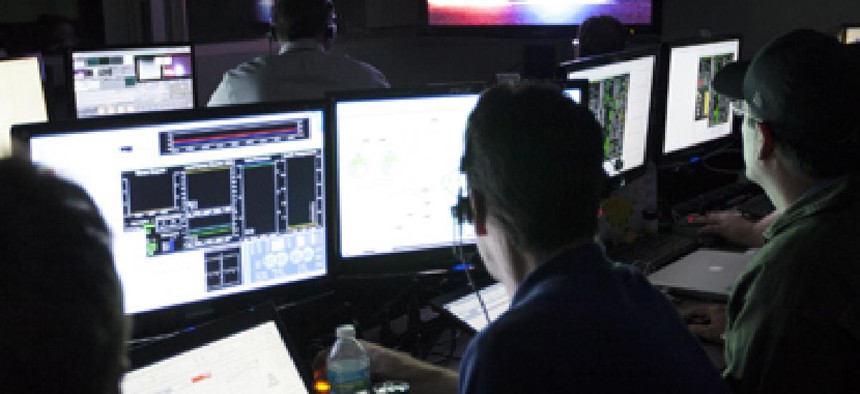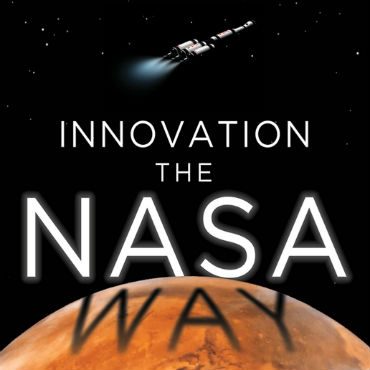Learning to innovate like NASA

Start by thinking big. "There is always time later to rein in ideas to fit budget and schedule parameters," author Rod Pyle says.

This article is adapted from "Innovation the NASA Way: Harnessing the Power of Your Organization for Breakthrough Success," and is printed with the publisher's permission. Click here for a Q&A with the author about implications for other agencies.
Much has been written about how NASA has innovated to drive the exploration of space. The way private companies have built on NASA's experience and are now forging their own pathways to space with NASA's support is proof of the great things government can spark.
But how do we take those lessons and apply them here on Earth, in our own workplaces?
NASA has historically been centrally controlled and managed, although each field center has a degree of autonomy. Overall, the NASA of today bears only a fading resemblance to the space agency that flew to the moon. It has grown up (some would assert that it's simply grown old). The mainstays are there; the boldness, daring and passion that infused NASA in those years remain in a more mature and altered form. But so much else has changed.
For one thing, it is no longer an agency of white men in starched shirts and skinny ties. A visit to today's Mission Control, for example, will reveal a mélange of men and women of all ages and ethnicities. This is true across the agency. The backgrounds from which these people come -- whether it be traditional middle-class suburban America, a forested township in Tennessee, a neighborhood in Mumbai or some other part of the world -- are equally diverse. This is not your father's NASA.
However, the agency has also changed in some ways that are less desirable. While more demographically liberal, it is a more operationally conservative operation than it was in the past. This is in part a natural and proper outgrowth of experience and the maturing of space exploration. NASA doesn't need to take the same chances it did in the 1960s. It doesn't need to prepare and fly missions every 10 weeks, as it did in the Gemini years, to test orbital endurance and rendezvous techniques. And it does not need to be as daring.
Nor would budgets allow it to embrace those things, even if they were beneficial. At the height of the Apollo program, the space program devoured about 5 percent of the national budget. For many years now, it's been more like 0.5 percent. That's a huge difference. And don't think that just because we know more about what we are doing, it has gotten cheaper. Overall, it is a testament to the dedication of the workforce that the agency is able to accomplish what it does.
There is one more key element: NASA management. When you speak to the workforce about the management of the space agency, you will hear opinions across the range from deep admiration to frustration with an aging bureaucracy. But there's one thing most people will agree on: NASA strives to encourage innovation. The techniques vary among field centers and departments, but one common theme is freedom. Most departments that are engaged in planning future activities are given something akin to a "blue-sky" mandate. Think big, and don't just think outside the box -- start beyond the box.
Lessons from yesteryear
During the space race, NASA's golden age to many observers, innovation was encouraged in a number of ways. First came need-based innovation: The task set before the agency in 1961 was so vast and so demanding that the new and original became commonplace. Outside-the-box thinking was the norm; those ideas then had to be wrestled into some kind of box to make them reality.
The second was innovation at the end of a sharp stick. An example would be when George Low, then managing the Apollo Spacecraft Program Office, insisted that Wernher von Braun approve the "all-up" testing of the Saturn V; there simply was neither the time nor the resources to do the more traditional incremental testing.
Finally, there was innovation of the more blue-sky variety. Programs like the Apollo Applications Office, which thought up missions like a flyby of Venus with Apollo hardware and various other schemes, intended to use the designs of the space race for other missions. These were innovative missions that were flown only on paper for years, with one notable exception being Skylab.
Travel across the United States and visit the NASA field centers distributed across the country -- you will find people conceptualizing grand new programs with exciting and unique goals. It is an inspiring experience just to spend time in the same room with these folks; they define outside-the-box thinking.
And lessons from today
Despite the challenges of low budgets and risk aversion, thoughtful innovation does ascend through the system. There is always time later to rein in ideas to fit budget and schedule parameters. But if you don't go large at the beginning, you will never achieve greatness. This was phrased with eloquence by Dr. Jakob van Zyl, associate director of project formulation and strategy at the Jet Propulsion Laboratory:
"I want to first be completely unconstrained and think about what are the kinds of things [we can do] that will touch humanity. Then we can figure out how to make it affordable. We are spending taxpayer money after all."
This is a quietly voiced grand vision, and it points us toward some lessons from NASA's decades of leadership in space.
First, be bold
Words like "bold," "daring" and "passionate" are not always associated with NASA today, but they should be. Given proper resources, NASA has shown boldness in its five decades of work in space that makes most industries pale by comparison. By its very nature, space exploration is a dangerous business, and boldness is required to take even the first steps: considering where, then how, to go.
When President Kennedy sent a three-year-old NASA the mandate to go to the moon within nine years, it was an audacious goal. As was said at the time, the engineers didn't even know what they didn't know. The metallic alloys, the machining equipment, the methodologies and much more were not even on the drawing boards. And yet, by mid-1969, the manned landings had been achieved. Astronauts would walk on that airless world six times.
The shuttle, compromised though it was, represented a complete and total departure from what had gone before: a winged, reusable space plane that was capable of hauling heavy cargo into space and, when necessary, back to Earth. It bore little resemblance to the Saturn V moon rocket and shared few components with the Apollo program. Yet it fulfilled its mission for the next 30 years, albeit at a premium price.
Then the International Space Station came into being, the most expensive object ever created. This football-field-sized machine wheels overhead every 90 minutes, providing up to six occupants with a place to live, work and conduct research for the betterment of humanity. It is a triumph of engineering, international cooperation and accomplishment.
The boldness of these programs and of the people who created them can be an inspiration to all of us in daily life, not just our business endeavors. When we set out to bring innovation to our own workplaces and businesses, it is often with some degree of risk -- sometimes minor, sometimes great. But if we believe in our ideas, if we have confidence in ourselves and if we are bold in our plans and assertions, great things can happen. Without boldness, they will not.
Next, be daring
Bold plans require daring execution. When NASA accepted the mission of traveling to the moon, it took tremendous amounts of daring on the part of dozens of top executives, managers and other leaders to make the dream a reality. The bold goal was followed by daring execution.
Likewise, so did a more recent example: landing 2013's Curiosity rover on Mars. The bold decision to land a drivable machine on its wheels with a rocket pack, with a couple of thousand potential points of failure, took a lot of convincing to pull off -- not just with NASA upper management, but with the American scientific community and the public at large. The idea just looked crazy when it was presented, but the daring of the people who invented it and their raw determination to make it happen are inspiring.
And proceed with passion
Visit any NASA facility. Talk to the engineers; observe the flight controllers; chat with the thousands of people who design the missions, build the hardware, pay the bills, download and process the data, and all the rest. To a person, if you look closely, you will find a driving passion behind what he or she does. It may be harder to spot in some than in others, for passion can be a difficult thing to maintain in any government entity, even one as exceptional as NASA.
Any one of these people could make more money in private industry, yet they choose to stay with NASA. Why? It might be the exciting nature of the work; it might be that they are fulfilling a childhood dream. It might even, for some in the twilight of their careers, be the promise of a pension that they have earned with 30 years of service. But scratch the surface and you will find passion within.
The Grumman engineers who designed the Lunar Module, that most difficult of spacecraft to conceive and build, did so with great passion. The company had staked its reputation and even its future on the successful design and construction of a spacecraft that nobody even knew how to build when they started. It took rich reserves of passion and persistence to follow the Herculean task to its conclusion. But they did, and none of Grumman's machines failed in flight; indeed, without the Lunar Module on Apollo 13, the astronauts would have died within hours of the explosion that robbed them of the use of their Apollo capsule.
Likewise, the people who designed and fabricated the heat-shielding tiles for the space shuttle had great passion. Nobody was quite sure if the design would work. The idea seemed outlandish at the beginning -- cover the bulk of a huge space plane with fragile little ceramic tiles and affix them with glue? But the math checked out, the tests confirmed their beliefs, and the passion within them allowed the program to enjoy a high rate of success.
Living the inspiration
When you are faced with a challenge, large or small, in the workplace or your own private activities, think on the accomplishments over the last half-century of space exploration and the nature of the people and the system that allowed them to occur. Reflect on the boldness of the vision, the daring of the execution and the passion that drove it. Use this great gift to your own advantage, and achieve great things.
Innovation is where you find it; it is a serendipitous process that cannot be quantified. But when the spark is ignited within you, bring the qualities that took America to the moon, built a magnificent space station and explored the planets to your greatest dreams. And then watch how innovation can take root in your own endeavors.
NEXT STORY: 'The critical link is giving people ownership'


